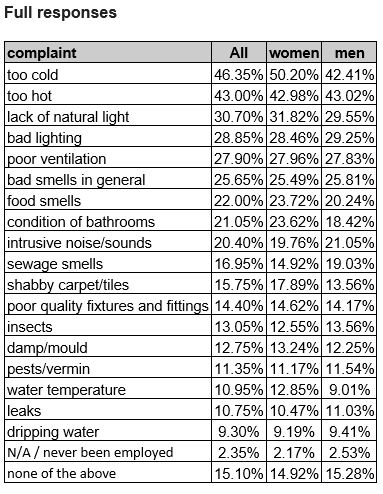May 28, 2019
Majority of workers think their workplace is unpleasant
 Many of the UK’s workplaces are unpleasant, uncomfortable and at risk of driving down productivity, according to a new survey from Aspect.co.uk. The poll of 2,000 people claims that 83 percent of UK adults consider their workplace to be an “unpleasant” environment, with many citing uncomfortable temperatures, lack of natural light, unpleasant smells, damp and mould, poor ventilation and even vermin and insects among their complaints. The study set out to identify the most common causes of employee discomfort at work. On the whole, issues related to physical comfort were the most common complaints. 46 percent complained of workplaces that were “too hot”, 43 percent complained of workplaces being “too cold” and 28 percent complained of workplaces having poor ventilation.
Many of the UK’s workplaces are unpleasant, uncomfortable and at risk of driving down productivity, according to a new survey from Aspect.co.uk. The poll of 2,000 people claims that 83 percent of UK adults consider their workplace to be an “unpleasant” environment, with many citing uncomfortable temperatures, lack of natural light, unpleasant smells, damp and mould, poor ventilation and even vermin and insects among their complaints. The study set out to identify the most common causes of employee discomfort at work. On the whole, issues related to physical comfort were the most common complaints. 46 percent complained of workplaces that were “too hot”, 43 percent complained of workplaces being “too cold” and 28 percent complained of workplaces having poor ventilation.
Workplace amenities were also a cause for concern. 21 percent complained about the condition of bathrooms, 16 percent cited shabbiness of flooring and carpets and 14 percent bemoaned their workplace’s poor quality fixtures and fittings. Other issues included intrusive noises, food smells, insect problems and dripping taps.
[perfectpullquote align=”right” bordertop=”false” cite=”” link=”” color=”” class=”” size=””]Employers ought to go further than simply meeting health and safety requirements to ensure workplaces are as pleasant and comfortable as possible[/perfectpullquote]
Workers aged 25-34 were the most likely to complain about their working environment and workers aged 55 and over were least likely to do the same. The condition of the UK’s workplaces appears to affect women and men differently too.
While women were only marginally more likely than men to consider their place of work to be unpleasant, women and men do tend to have different complaints. Water temperature, shabby flooring, condition of bathrooms, workplaces being too cold and food smells were more likely to be a problem for women. Sewage smells, intrusive sounds, insects, leaks and pests were more of a cause for concern for men.
Professor Sir Cary Cooper CBE is a specialist in organisational psychology and health with a focus on workplaces. He believes employers are failing to get the basics right when it comes to creating a decent working environment. “As we saw with the burst water pipe in the House of Commons back in April, a physically unpleasant or even unsafe workplace is obviously bad for productivity and for an organisation’s external image. Issues like intrusive noises, uncomfortable temperatures and general shabbiness can be a distraction, but it’s also a matter of respect from employers toward their people. Employers ought to go further than simply meeting health and safety requirements to ensure workplaces are as pleasant and comfortable as possible.
“Those that don’t are sending a signal to their people that their physical comfort and freedom from distraction are a low priority, which can be demoralising for any workforce. That’s not to say organisations need to invest in high-spec fit-outs and luxurious surroundings, but they should focus instead on meeting a basic standard of environmental comfort appropriate for their industry.
The complaints highlighted in the study suggest a wide spectrum of failure when it comes to meeting these basic standards. Workplaces should be a comfortable temperature and well-lit where possible, free from intrusive noise, bad smells and other avoidable sources of unpleasantness.”
Image: A still from Akira Kurosawa’s film Ikiru
















